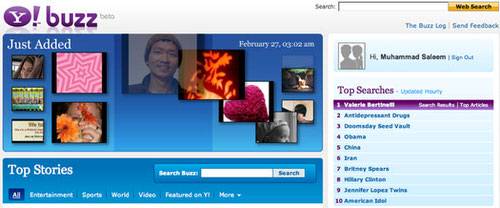As soon as the online press got hold of a sliver of information about Yahoo! Buzz, the predictable cries of “Digg clone!” were loud enough to drown out anyone who thought that Yahoo! Buzz might be something more than a lame attempt at socially driven news (without the social elements). While many people think that the flurry of recent launches from Yahoo! represent nothing more than a cry of desperation, I think Yahoo! Buzz, at least, sets itself apart from the rest.

This is a guest post by Muhammad Saleem, a social media consultant and a top-ranked community member on multiple social news sites.
I also understand why people might think that this launch is a competitor to Yahoo!’s own Del.icio.us, but I think that notion is a little mistaken. While socially driven news is ultimately an evolution of social bookmarking, the latter has evolved to the point where the two concepts can live largely independent of each other. For example, I use multiple social news sites, but use them predominantly to submit for and share with large groups of people (whom I don’t even know in most cases, hence socially driven news). At the same time, I use Del.icio.us (and Instapaper more recently) to specifically bookmark a piece of information that I will have to recall later (or want to save for the long run), or that I want to share with a small, relatively defined circle of people. As long as Yahoo! can make the distinction between bookmarking information (long-term, more intimate) and driving news (more current, for the mass audience), I think both products can peacefully coexist.

Yahoo! is moving in the right direction, and a very exciting one for all parties involved, and here’s why.
Why Yahoo! Has Me Buzzing
1. Integrating Search
Anyone who has ever used Google Zeitgeist knows how interesting and useful search statistics can be for determining what’s hot and capturing people’s imagination right now (i.e. Hot Trends that update throughout the day) as well as what people are interested in over the long-term and depending on the season (i.e. Trends). Now imagine the same principle being applied to social news. If people are searching for what is important and relevant to them (and often looking for more information on breaking news or other events that are happening at the moment) using that as one of the many ‘popularity factors’ ensures that the content is always generally popular and relatively current. Of course, that is just one of the many factors they take into account, but for now, this is a factor that is unique to Yahoo! Buzz.
2. It’s Still Social
Too many people have unfairly characterized Yahoo! Buzz as not being social. A more fair characterization would be to argue that Yahoo! Buzz is not as democratic as some of its competitors, but it’s still very social. First, the fact that user search patterns is one of the ‘popularity factors’ means that Yahoo! Buzz content is being dictated by its audience, not to mention that people can still buzz (vote for) stories they like, from the pool that has been preselected for them. Additionally, people can still share stories directly with their friends/contacts and further socialize the content by posting it to other social sites (which are all factors taken into account when measuring an article’s popularity). While users aren’t allowed to submit content and some advanced features, such as user groups, don’t exist in the current build, the site is a solid half-way point between traditional media and new media. The sources are limited and largely mainstream, but what’s popular is in the hands of the people.
3. Only Publishers Need Apply
There have been two major problems that people have had with Yahoo! Buzz. The first, as discussed above, is the users’ inability to submit stories, and the second is the limited sources from which the information is taken. Yahoo! Buzz only allows sites that are a part of the Yahoo! Publisher Network (i.e. sites that run Yahoo! text ads alongside their content) to be included in the index of content users can vote on. Honestly, I think this is the smartest move Yahoo! could have made for itself. However, does this mean that we won’t get all the niche content that we have learned to love? Let me put it this way, in case you didn’t read the fine print:
“Every day, a few of the top Buzz articles will be bumped
onto the Yahoo.com main page, giving the story potentially the widest
audience possible on the internet. Reports suggest that, in tests,
links to Wired.com received over 2 million unique hits in 2 hours.”*
* Note: Yahoo! says that they are able to rotate coverage on the main page for smaller sites unable to keep up with the traffic.

Now let me ask you, have you gotten your Digg fix today?
I agree that the limited selection is off-putting, but being realistic, I don’t see this as a problem at all. With the prospect of being featured on the Yahoo! main page, or even being featured among the top stories on Yahoo! Buzz (which I think will have no trouble building traffic) is an incredibly lucrative proposition that no one in my mind would decline just because it requires you to be a part of YPN. As soon as the site is taking applications (I’m not sure how the inclusion process will end up working), you can bet that every site out there will want a piece of the Buzz and niche content wont be hard to find at all.
More generally, with social news, it’s always a chicken and egg game. You need a community to get good content, you need good content to build a community, but that community won’t come if there is no good content, content that they are supposed to provide. Well here’s where Yahoo! gets lucky. Yahoo! already has millions of registered users and millions of people visiting the site daily that can actively be converted to Buzz participants by either driving traffic or integrating the new site with search and news features on the portal. Just as important, Yahoo! doesn’t immediately need a large user base (for submissions) because the content (from pre-approved publishers) is automatically indexed on the site and users can browse and vote it up.
Why Yahoo! Should Be All Abuzz
Yahoo! Buzz is a great proposition for everyone but the most active and most passionate participants of socially driven news sites (all 1,000 of us). Without making this too long, Yahoo! is giving you, as a publisher, the opportunity to reach fairly good circulation directly through the Buzz site, and a chance at fulfilling your yearly traffic and exposure quota and all you have to do is three things. First, make sure that you are a member of the Yahoo Publisher Network, second, join Yahoo! Buzz, third, create relevant and quality content that people want to read. And as a reader or member of the social news community, Buzz gives you the quality and breadth of Yahoo! News and, as of now, 100 other high quality publishers from across the web (likely to increase massively), while at the same time letting you have some say in what gets exposure and experiment with social news elements.
This is an excellent move for Yahoo! in many ways. This is the easiest way to explain what Yahoo! is about to create: Imagine if Digg had 10 times the incoming traffic, and got a percentage of ad-revenue from each of the sites that were promoted to the front page. Yahoo! Buzz does essentially that. The site, combined with the possibility of being featured on the Yahoo! main page, comprises of tens of millions of potential page views and because you have to be a member of the Yahoo Publishing Network, whenever content is promoted and trafficked by the Yahoo! audience, Yahoo! gets a piece of the advertising revenue pie. Not only does this increase the conversions for Yahoo! Publisher Network, but it also increases the revenue per conversion for Yahoo!. In essence, they’re getting their ads on the sites and then creating traffic for the same sites.
Ultimately, Buzz is very much a beta product – but it has massive potential. The site should certainly allow user submissions (though I think it’s okay to require sites to be a part of YPN), and is missing a host of other features. But even in its current state, I think everyone wins – Yahoo!, the content producers/publishers, and even most of the readers.










